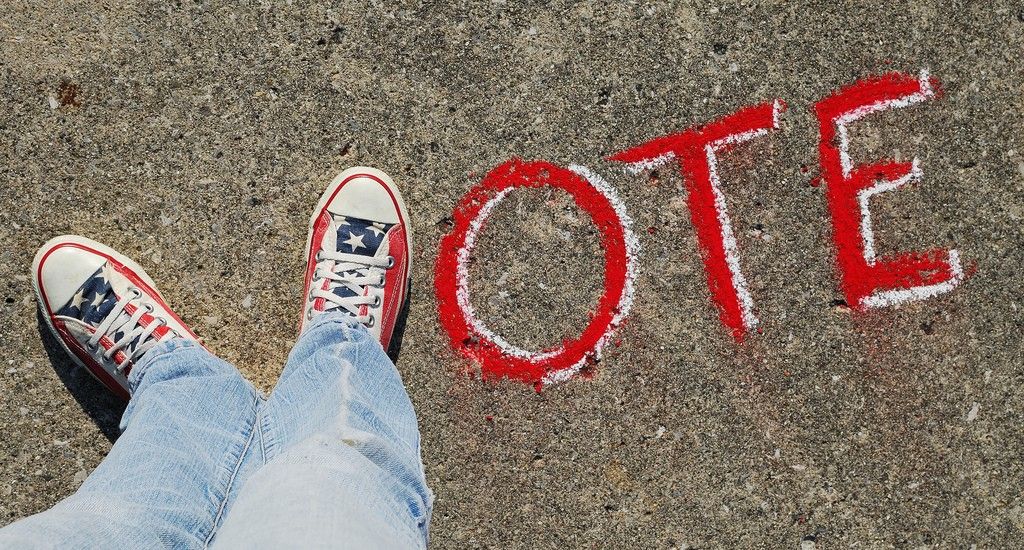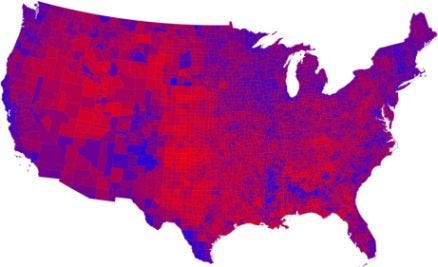How to Make Our Votes for President of the United States Actually Count

After what feels like the longest election in the history of the United States, Election Day 2016 is finally coming up on November 8th, and once again, because of the Electoral College system and how it works, for the majority of citizens, myself included, our votes won’t actually matter.
We don’t actually vote for President. We vote to suggest to a group of 538 electors who we think they should vote for. Not only that, but each state’s electors (with the exception of Nebraska and Maine) are winner take all, which has some surprisingly undemocratic consequences.
Yep, we’ve got a big problem. We like to pretend we have a democracy, but we don’t. Whoever gets the most votes, does not necessarily win. In fact, because of the Electoral College, it’s actually theoretically possible for someone to lose after getting 78% of the popular vote to someone who only got 21.91% of the popular vote.
Don’t believe me? I’ll just let CGP Grey explain. He’s really good at this stuff.
As if it’s not bad enough that someone so wanted by the overwhelming majority of the country could ever be beaten by someone the country absolutely doesn’t want, thanks to our peculiar use of electors, I would argue its effect on our participatory democracy is even worse, because it begs the question, “What’s the point?”
Take my state for example. I live in Louisiana. According to the latest polls on FiveThirtyEight, there is a 99.5% chance that Trump will win this state, and therefore all 8 of this state’s electoral votes. The thing is, if he won with one vote over 50% of the vote, he’d still get all 8 electoral votes, and therefore the votes of anyone above that mark don’t matter. If you vote for Trump or you vote for Hillary, it really doesn’t matter because this state is not even close to being a swing state. It’s a decided-in-advance state.
The situation is different in Florida where there are 29 electoral votes up for grabs, and a 51% chance currently that Hillary will win them versus a 49% chance that Trump will. That’s basically a flip of a coin, and so in Florida every vote counts because even one vote could sway the election, and all its 29 electors along with it.
It doesn’t have to be this way though. And it arguably shouldn’t because someone barely winning all of the votes is another way of saying the people are in a state of maximum disagreement. There’s no shorter way to tearing a country in half than making sure half of its electorate feels entirely unrepresented.
Thankfully, the Constitution allows each state to allocate its electors however they see fit, so if all states apportioned their electors according to their respective popular votes, a really close election in Florida could result in 15 electors voting for the winner and 14 electors for the loser. Someone barely winning is thereby reflected in the results and more people feel represented.
Meanwhile, back here in Louisiana, it could mean 5 votes going to Trump and 3 votes going to Hillary. Because electors would be allocated based on percentage, it would incentivize everyone to vote just like being a swing state incentivizes everyone in Florida to vote. It’s the difference between your vote being heard, and your vote being silenced. Winner-take-all is a bad idea.
The trick though, and why this seemingly simple fix to a flawed system hasn’t been enacted yet, is because to do it one by one could flip elections for decades to come. Imagine if California decided to apportion its electors by popular vote and 49% voted Republican. That would mean an extra 27 electoral votes for Republicans and 27 fewer electoral votes for Democrats going forward. And the same is true for a state like Texas, but the other way around.
However, some bright people have figured out a way around this quandary, and it’s called the National Popular Vote bill. Basically, it’s like a Kickstarter for democracy, where state after state pledges to apportion their electors by popular vote, but only after enough states all together pledge to do so, such that the sum total of their electors reaches the 270 electoral votes required for a candidate to win the presidency. Clever, isn’t it?
If we care about democracy, and if we want everyone’s vote to count each time we go to the polls to choose our next president, we’ll do this. We’ll contact our representatives and we’ll demand they support it. And if we don’t, we’ll just keep on making every Election Day mostly pointless for all states but swing states.
Election 2020
So is there a way to make our votes count this year if we happen to live in a solid “red” or “blue” state like Louisiana? Yes, there is. The results of the national popular vote do actually matter for something, but not for this presidential election. They matter for the next presidential election.
Here’s the thing. If a candidate gets 5% of the popular vote nationally, that party’s candidate will qualify for federal matching funds the next time around. Basically, we may not have a democracy when it comes to the presidency, but we do have a democracy when it comes to deciding which political parties get money, and therefore which parties get on all the ballots, and therefore most importantly, which third parties are seen as threats.
“Their function has not been to win or govern, but to agitate, educate, generate new ideas, and supply the dynamic element in our political life. When a third party’s demands become popular enough, they are appropriated by one or both of the major parties and the third party disappears. Third parties are like bees: once they have stung, they die.” — Richard Hofstadter
So if you want your vote to matter if you happen to not live in an all-votes matter swing state, vote for a third party. If that party gets 5% of the popular vote nationwide, the policies of its platform are more likely to be added to the platforms of the two main parties out of fear of losing votes to them next time around. You have nothing to fear in a solid red or blue state. You can vote strategically.
For me personally, as a US citizen residing in Louisiana, my vote will be going to the Green Party in hopes I can help it get federal matching funding in 2020, because the two most important issues to me are taking action on climate change and adopting universal basic income. Both are part of the Green Party platform. For anyone who might get upset with that, again, there is a near-zero chance of Hillary winning my state and a virtual lock for Trump. The only way for my vote for President to actually matter is by popular vote.
By the way, there are a lot of other great ideas out there to strengthen our democracy than just making sure we reform our Electoral College system so that the electoral votes of each state are not winner take all.
Fair Representation
The way we draw our districts are simply insane. Gerrymandering is destructive to democracy. Our districts should be redrawn in a way that makes sense, and our representatives should represent who we actually are. We need fair representation.
Ranked Choice
Ranked choice voting or (instant runoff) is also a key part of the democratic reform we need. Third parties should never be considered spoilers. We should always be able to vote for who we most want to represent us, in a way that doesn’t make it more likely for someone to win who we’d never want to represent us.
There are even more and better ideas than this, but ranked choice would be a definite improvement. Another big improvement would be allowing everyone to vote in our primaries.
Open Primaries
43% of the country considers itself as independent and yet in all states with closed primaries, they aren’t allowed to vote in the primaries unless they pick a party they don’t feel actually represents them. This is hugely problematic because their taxes are paying for the elections they aren’t allowed to vote in. But even worse than that, the result is that those with extreme views win primaries, because they are trying to win the support of their respective bases instead of the independent voters that aren’t allowed to vote for them. Then come the general election, independents are forced to choose among two candidates they never would have voted for, had they been allowed to vote previously. Closed primaries are a recipe for bad government.
Election Holiday
Finally, perhaps the most common sense improvement of all, is to simply make it easier for people to vote. Make it a national holiday or move it to the weekend. Or both, by moving it to a Friday or a Monday and making it a three-day weekend.
If we can’t take the day off, at least allow everyone to vote by mail. Let’s stop putting up barriers to voting by pretending voter ID laws are a good idea. They’re not. They didn’t even exist before 2006 and are a blatant attempt to engineer election outcomes through selective disenfranchisement.
Our goal should be to grow and strengthen our democracy over time. The changes we can make that will empower more people to vote and make sure their voices are actually counted and heard are the changes we need. Anything we do to prevent that or even go in the other direction are dangerous and should be reconsidered.
Don’t be fooled into protecting the status quo. It is in the interest of our two major parties to claim voting for anyone else but them is a wasted vote. That they don’t immediately do something like implement ranked-choice voting after each election to make sure that no one’s vote serves as a “spoiler” the next time around simply goes to show they want it this way. They want you to feel forced to vote R or D, red or blue. They even want you to only vote against who you don’t like instead of who you actually want, because if all you’re voting for is against something, they never have to support what you’re for.

Democracy is not a country of red and blue. Democracy is essentially purple. It’s also green, and orange, and yellow, and all the rest. This is the country we actually live in, and if we want to “make it great again” improving our elections to be more democratic should be front and center. And considering the ideals our country was founded upon, no one, no matter how conservative or liberal, should be against the idea that voting is perhaps the most important right of citizenship, and even the price of freedom itself.
This is America. Let’s make all our votes actually count.
For further reading, I recommend this next, and also a visit to FairVote.org.

Did you enjoy reading this? Please click the subscribe button and also consider making a monthly pledge in support of my daily advocacy of basic income for all.
_large.jpg)
UBI Guide Newsletter
Join the newsletter to receive the latest updates in your inbox.



